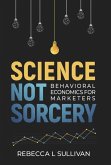Behavioral Business Ethics
Shaping an Emerging Field
Herausgeber: De Cremer, David; Tenbrunsel, Ann E
Behavioral Business Ethics
Shaping an Emerging Field
Herausgeber: De Cremer, David; Tenbrunsel, Ann E
- Gebundenes Buch
- Merkliste
- Auf die Merkliste
- Bewerten Bewerten
- Teilen
- Produkt teilen
- Produkterinnerung
- Produkterinnerung
This book looks at how and why individuals display unethical behavior. It emphasizes the actual behavior of individuals rather than specific business practices. It draws from work on psychology; as Max Bazerman said, "efforts to improve ethical decision making are better aimed at understanding our psychological tendencies".
Andere Kunden interessierten sich auch für
![Values and Ethics of Industrial-Organizational Psychology Values and Ethics of Industrial-Organizational Psychology]() Joel LefkowitzValues and Ethics of Industrial-Organizational Psychology174,99 €
Joel LefkowitzValues and Ethics of Industrial-Organizational Psychology174,99 €![Satisfaction: A Behavioral Perspective on the Consumer Satisfaction: A Behavioral Perspective on the Consumer]() Richard L OliverSatisfaction: A Behavioral Perspective on the Consumer291,99 €
Richard L OliverSatisfaction: A Behavioral Perspective on the Consumer291,99 €![The Psychology of Selling The Psychology of Selling]() Brian TracyThe Psychology of Selling13,26 €
Brian TracyThe Psychology of Selling13,26 €![Rationality and Structure in Behavioral Models of Business Systems Rationality and Structure in Behavioral Models of Business Systems]() John D W MorecroftRationality and Structure in Behavioral Models of Business Systems33,99 €
John D W MorecroftRationality and Structure in Behavioral Models of Business Systems33,99 €![Marketing to Millennials Marketing to Millennials]() Jeff FrommMarketing to Millennials18,99 €
Jeff FrommMarketing to Millennials18,99 €![Business Ethics and the Austrian Tradition in Economics Business Ethics and the Austrian Tradition in Economics]() Hardy BouillonBusiness Ethics and the Austrian Tradition in Economics200,99 €
Hardy BouillonBusiness Ethics and the Austrian Tradition in Economics200,99 €![Science Not Sorcery: Behavioral Economics for Marketers Science Not Sorcery: Behavioral Economics for Marketers]() Rebecca L. SullivanScience Not Sorcery: Behavioral Economics for Marketers42,99 €
Rebecca L. SullivanScience Not Sorcery: Behavioral Economics for Marketers42,99 €-
-
-
This book looks at how and why individuals display unethical behavior. It emphasizes the actual behavior of individuals rather than specific business practices. It draws from work on psychology; as Max Bazerman said, "efforts to improve ethical decision making are better aimed at understanding our psychological tendencies".
Hinweis: Dieser Artikel kann nur an eine deutsche Lieferadresse ausgeliefert werden.
Hinweis: Dieser Artikel kann nur an eine deutsche Lieferadresse ausgeliefert werden.
Produktdetails
- Produktdetails
- Verlag: Taylor & Francis
- Seitenzahl: 266
- Erscheinungstermin: 25. Oktober 2011
- Englisch
- Abmessung: 236mm x 156mm x 22mm
- Gewicht: 496g
- ISBN-13: 9780415873246
- ISBN-10: 041587324X
- Artikelnr.: 36813223
- Herstellerkennzeichnung
- Libri GmbH
- Europaallee 1
- 36244 Bad Hersfeld
- gpsr@libri.de
- Verlag: Taylor & Francis
- Seitenzahl: 266
- Erscheinungstermin: 25. Oktober 2011
- Englisch
- Abmessung: 236mm x 156mm x 22mm
- Gewicht: 496g
- ISBN-13: 9780415873246
- ISBN-10: 041587324X
- Artikelnr.: 36813223
- Herstellerkennzeichnung
- Libri GmbH
- Europaallee 1
- 36244 Bad Hersfeld
- gpsr@libri.de
David De Cremer is Professor of Behavioral Business Ethics at Rotterdam School of Management, Erasmus University, Scientific director of the Erasmus Centre of Behavioral Ethics, and professor of Organizational Behavior at London Business School, UK. He is the recipient of many scientific awards including the British Psychology Society award for "Outstanding Ph.D. thesis in social psychology," the "Jos Jaspars Early Career award for outstanding contributions to social psychology," the "Comenius European Young Psychologist award," and the "International Society for Justice Research Early Career Contribution Award." He has published extensively in the main journals in the fields of psychology, management and organizational behavior, edited five books and nine special issues and written a book on "When good people do bad things: Illustrating the psychology behind the financial crisis." His work has been discussed in the American Scientist, The Economist and The Financial Times. He writes regularly columns and opinion pieces in the financial newspapers and magazines in the Netherlands, Belgium and the UK. In 2009 he was elected as the best publishing Economist in the Netherlands. Previously, De Cremer held teaching and research positions at New York University (Department of Psychology and Centre of Experimental Social Sciences), Harvard University (Kennedy School of Government), Maastricht University (Department of Organization Studies and Department of Psychology), and Tilburg University (Department of Psychology). De Cremer holds a Ph.D. in Social Psychology from the University of Southampton, England, and an M.A. in Social Psychology from the University of Leuven, Belgium. Ann E. Tenbrunsel (Ph.D., Northwestern University; M.B.A. Northwestern University; B.S.I.O.E. University of Michigan) is a Professor in the Mendoza College of Business at The University of Notre Dame and the Arthur F. and Mary J. O'Neil Co director of the Institute for Ethical Business Worldwide. Her research interests focus on the psychology of ethical decision-making, with her dissertation on this topic winning the State Farm Dissertation Award. Her work in this area has focused partially on the situational factors that lead to unethical decision-making, including the role that temptation, uncertainty, power and sanctions play in the ethical decision-making process. More recently, she has explored the process of ethical fading, arguing that individuals often make unethical decisions because the ethical aspects of the decision are hidden to the decision maker. She has also examined the role that organizations play in promoting unethical decisions, including the influence of formal and informal systems. In addition to recently coauthoring a review of the ethics field, she is the co-editor of four books on these topics and has published her research in a variety of journals such as Administrative Science Quarterly, Academy of Management Review, Academy of Management Journal, Organizational Behavior and Human Decision Processes, Journal of Applied Psychology, and Journal of Personality and Social Psychology. She is currently serving on the Editorial Board of Business Ethics Quarterly and Organizational Behavior and Human Decision Processes and has served as a guest editor for the Journal of Business Ethics. Ann has received grants from the National Science Foundation to pursue her work and has published teaching materials on ethical and environmental issues that have been used both domestically and internationally.
A.P. Brief
Series Foreword. Part 1. Introduction. D. De Cremer
A.E. Tenbrunsel
On Understanding the Need for a Behavioural Business Ethics Approach. Part 2. A View on Behavioral Business Ethics. A.P. Brief
The Good
the Bad
and the Ugly: What Behavioral Business Ethics Researchers Ought to be Studying. Part 3. Ethics and Social Context. M. Schminke
M. Priesemuth
Behavioral Business Ethics: Taking Context Seriously. M. Hernandez
S.B. Sitkin
Who is a Leader? Follower Influence on Leader Ethicality. Part 4. Fairness and Morality. E. van Dijk
E.W. de Kwaadsteniet
L. Koning
About Behaving (Un)ethically: Self-interest
Deception
and Fairness. R. Folger
Deonance: Behavioral Ethics and Moral Obligation. G.R. Weaver
M.E. Brown
Moral Foundations at Work: New Factors to Consider in Understanding the Nature and Role of Ethics in Organizations. T.R. Tyler
Defining Behavioral Ethics: The Role of Morality in Business Organizations. Part 5. Bounded Ethicality. J. Dana
G. Loewenstein
R. Weber
Ethical Immunity: How People Violate Their Own Moral Standards Without Feeling They are Doing So. L.L. Shu
F. Gino
M.H. Bazerman
Changing Our Attitudes to Resolve Moral Dissonance.
Series Foreword. Part 1. Introduction. D. De Cremer
A.E. Tenbrunsel
On Understanding the Need for a Behavioural Business Ethics Approach. Part 2. A View on Behavioral Business Ethics. A.P. Brief
The Good
the Bad
and the Ugly: What Behavioral Business Ethics Researchers Ought to be Studying. Part 3. Ethics and Social Context. M. Schminke
M. Priesemuth
Behavioral Business Ethics: Taking Context Seriously. M. Hernandez
S.B. Sitkin
Who is a Leader? Follower Influence on Leader Ethicality. Part 4. Fairness and Morality. E. van Dijk
E.W. de Kwaadsteniet
L. Koning
About Behaving (Un)ethically: Self-interest
Deception
and Fairness. R. Folger
Deonance: Behavioral Ethics and Moral Obligation. G.R. Weaver
M.E. Brown
Moral Foundations at Work: New Factors to Consider in Understanding the Nature and Role of Ethics in Organizations. T.R. Tyler
Defining Behavioral Ethics: The Role of Morality in Business Organizations. Part 5. Bounded Ethicality. J. Dana
G. Loewenstein
R. Weber
Ethical Immunity: How People Violate Their Own Moral Standards Without Feeling They are Doing So. L.L. Shu
F. Gino
M.H. Bazerman
Changing Our Attitudes to Resolve Moral Dissonance.
A.P. Brief
Series Foreword. Part 1. Introduction. D. De Cremer
A.E. Tenbrunsel
On Understanding the Need for a Behavioural Business Ethics Approach. Part 2. A View on Behavioral Business Ethics. A.P. Brief
The Good
the Bad
and the Ugly: What Behavioral Business Ethics Researchers Ought to be Studying. Part 3. Ethics and Social Context. M. Schminke
M. Priesemuth
Behavioral Business Ethics: Taking Context Seriously. M. Hernandez
S.B. Sitkin
Who is a Leader? Follower Influence on Leader Ethicality. Part 4. Fairness and Morality. E. van Dijk
E.W. de Kwaadsteniet
L. Koning
About Behaving (Un)ethically: Self-interest
Deception
and Fairness. R. Folger
Deonance: Behavioral Ethics and Moral Obligation. G.R. Weaver
M.E. Brown
Moral Foundations at Work: New Factors to Consider in Understanding the Nature and Role of Ethics in Organizations. T.R. Tyler
Defining Behavioral Ethics: The Role of Morality in Business Organizations. Part 5. Bounded Ethicality. J. Dana
G. Loewenstein
R. Weber
Ethical Immunity: How People Violate Their Own Moral Standards Without Feeling They are Doing So. L.L. Shu
F. Gino
M.H. Bazerman
Changing Our Attitudes to Resolve Moral Dissonance.
Series Foreword. Part 1. Introduction. D. De Cremer
A.E. Tenbrunsel
On Understanding the Need for a Behavioural Business Ethics Approach. Part 2. A View on Behavioral Business Ethics. A.P. Brief
The Good
the Bad
and the Ugly: What Behavioral Business Ethics Researchers Ought to be Studying. Part 3. Ethics and Social Context. M. Schminke
M. Priesemuth
Behavioral Business Ethics: Taking Context Seriously. M. Hernandez
S.B. Sitkin
Who is a Leader? Follower Influence on Leader Ethicality. Part 4. Fairness and Morality. E. van Dijk
E.W. de Kwaadsteniet
L. Koning
About Behaving (Un)ethically: Self-interest
Deception
and Fairness. R. Folger
Deonance: Behavioral Ethics and Moral Obligation. G.R. Weaver
M.E. Brown
Moral Foundations at Work: New Factors to Consider in Understanding the Nature and Role of Ethics in Organizations. T.R. Tyler
Defining Behavioral Ethics: The Role of Morality in Business Organizations. Part 5. Bounded Ethicality. J. Dana
G. Loewenstein
R. Weber
Ethical Immunity: How People Violate Their Own Moral Standards Without Feeling They are Doing So. L.L. Shu
F. Gino
M.H. Bazerman
Changing Our Attitudes to Resolve Moral Dissonance.








